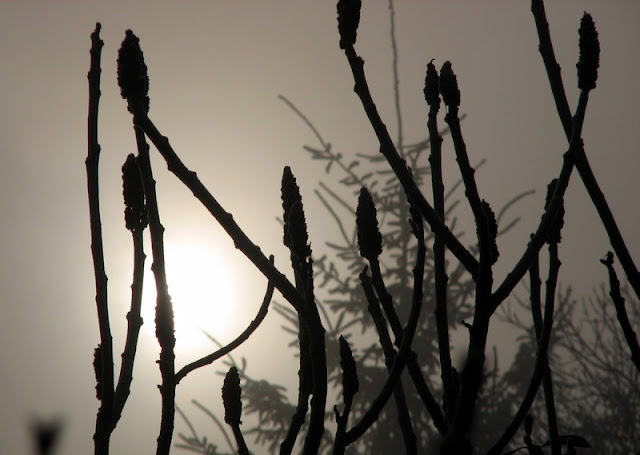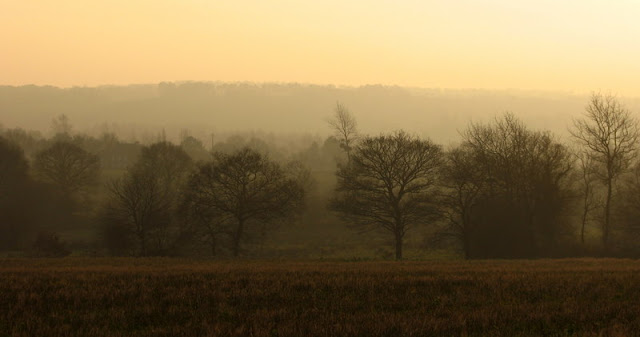
" '... the whole sensible appearance of things (omnes rerum temporalium species) is the lotus flower,' said Paulinus of Nola ... it is at its greatest in Lucretius 'austerity of rapture', denying all that lies beyond the flaming ramparts of the world; at it loveliest in lines from the Georgics, the blue smoke mounting at evening from the little farms, and the shadow of the hills on the plain."
(Helen Waddell - The Wandering Scholars of the Middle Ages)
~
The frost, which deepens every morning, has caught the last of the roses,

and crushed the lemon scented geranium to sorbet. We have been sitting in a crystal sphere of high pressure, and thought the cold can be a struggle and a hardship, the days have grown into blues and golds more intense and yearning than those of summer can ever be.

It has taken me a long time to repossess my birth month as the one where I belong, the most precious of the year, to find the depth and dearness of these short days; for many years we were strangers. Now I know there is no peace like December's, no light like that of a clear day at the winter solstice, no shapes lovelier than those of leafless trees inked onto early evening sky. I feel sure I could never happily live in a place where December came in summer.
~

I light the fire early, spend much of the day at the table beside it, writing, eating, drawing, drinking - hot drinks as much as anything alcoholic - and reading. Helen Waddell leads me from the fall of Rome to the wondrous twelfth century, bringing to life the extraordinary pools and flashes, reservoirs and illuminations of grace and gentleness and beauty that held their own against the dark and brutal background of those times. History probably contains no parallels, but perhaps some echoes. She writes poetry of poetry, lyrical stories of loss and beginnings, of attainment and partings.
~

I have drenched myself in light and colour, pointing the camera at the gradually diminishing fruit bowls,


or Christmas cake,

or at the roses which came as a gift (churlish to grumble at being given roses, by a neighbour and her granddaughter whom I occasionally teach, but these sad, scentless, fondant-icing things, costly and wasteful to grow and buy, I would prefer not to have; I like the gallant, frost-perished mummified relics in the garden better).

The new coloured pencils are more vivid and luminous than should really be countenanced, nearly hallucinogenic, compelling. They still alarm me a little. I've found myself doodling cute cartoonish Georgic vignettes, or simply producing formless washes, just to swim in their colours, which don't really appear until the water touches them, rather like Japanese water flowers, or those magic painting books that I had as a child, grey dots until washed with a wet brush.

In the afternoons I walk up the hill. The only sounds the calls of birds: flocks of wintering larks and bramblings, a marsh harrier coming up out of a fallow field, jays and magpies staccato quarrelling, a majestic heron soaring. Tipped furthest from it as we are now, the sun seems paradoxically to be closer to us;
~

it bobs along at my shoulder height as I walk the ridge road, and as I stand among the lifeless and ghostly stalks and husks of the maize field,

it floods this quiet, dreaming, austerely rapturous land with rose and orange, and I think perhaps I am at the flaming ramparts of the world, and I need go no further.



The little farms of my village are stone and slate and rendered concrete now, not thatch and withies like Virgil's probably were, and indeed, are no longer even farms, though their inhabitants may be farmers, or the children or grandchildren of farmers, as I am. The comforting blue smoke is as likely from central heating boilers, though there is woodsmoke too. Yet they nestle in the shadow of the hills at evening, which stretches over the plain towards the sea, and they draw me back with so much that is held dear.

This peace, this joy are flawed, illusory; they are pampered, solipsistic and doomed, for me and for the world. Pain and despair drip in through the cracks, the intractability of our condition; the human race is living in end times, it always did. But for now, we are safe and curled in the 'whole sensible appearance of things', the lotus that can drug us into believing that the world is sweet. I can't say I mind.

The weather has changed, but not eased, the piercing clarity of the last several days has given way to a freezing fog, the lightless damp of which offsets any rise in temperature. Long since mercifully relieved of any sense of obligation to party in the New Year, or of failure that we don't, or requirement to drive home tired and dispirited (New Year clebrations usually left me feeling this way...) on dark and dangerous roads , we may or may not stay up. We'll meet friends for a lunch (or brunch, indeed, they being in part American) party tomorrow, which I'm happy about; preferring a baptism of the new to a wake for the old. The Twelfth Day, the Feast of the Kings, will be the last of my holidays. About right.
Happy New Year.
~~~























 Here is a gorgeous, warm, tweedy red Irish wool jacket ('cardigan' is not a word worthy of it). The photo doesn't do the colour justice, it's a redder red than that. Not only does it gratify the visual and tactile senses, but the olfactory also; it smells like a real,very clean, Irish sheep, all lanolin and peaty air!
Here is a gorgeous, warm, tweedy red Irish wool jacket ('cardigan' is not a word worthy of it). The photo doesn't do the colour justice, it's a redder red than that. Not only does it gratify the visual and tactile senses, but the olfactory also; it smells like a real,very clean, Irish sheep, all lanolin and peaty air!

 Oh, and then there were these two pretty bookmarks from Princeling. Clever boy!
Oh, and then there were these two pretty bookmarks from Princeling. Clever boy!







